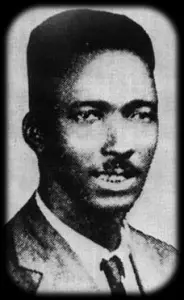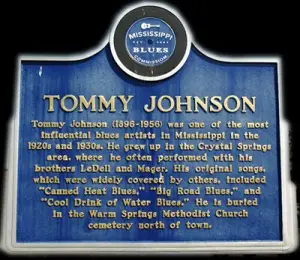TOMMY JOHNSON
 The Dockery Plantation, just a few miles from Clarksdale Mississippi, was home to the giants of early Delta Blues. The folk music played by the country people there formed the origins of The Blues, and it spread out from that district all over The South, all over the country and all over the world. Tommy Johnson, Charley Patton and Son House, all lived at Dockery at various times, and their mutual friend Willie Brown brought the young Robert Johnson there in 1930. Tommy Johnson is perhaps the least well known of these ‘big beasts’, and his recording career amounted to only 14 tracks, but his contribution to country Blues was enormous and his cultural links back to Africa are clearly important.
The Dockery Plantation, just a few miles from Clarksdale Mississippi, was home to the giants of early Delta Blues. The folk music played by the country people there formed the origins of The Blues, and it spread out from that district all over The South, all over the country and all over the world. Tommy Johnson, Charley Patton and Son House, all lived at Dockery at various times, and their mutual friend Willie Brown brought the young Robert Johnson there in 1930. Tommy Johnson is perhaps the least well known of these ‘big beasts’, and his recording career amounted to only 14 tracks, but his contribution to country Blues was enormous and his cultural links back to Africa are clearly important.
Tommy was born in a little place called Terry, a few miles outside Jackson Mississippi, in the mid-1890s and he was a runaway teenager playing his guitar around the district. When he wandered north into the Delta in the early 20s, he met Willie Brown and Charley Patton, and while Tommy was never known as a technically brilliant guitarist, he picked up enough Blues licks from them to back up his remarkable voice. One of the most prominent African retentions in the Blues is falsetto singing, but far from seeming effeminate, the use of falsetto is a mark of extreme masculinity in West African traditional music. Tommy’s natural voice was big and rounded and he could growl and rumble like a bear, but his falsetto was truly startling and his vocal style used his full range to good effect. It was not just guitar licks that Tommy picked up from Charley either. The showmanship Charley employed on stage; playing the guitar between his legs as if riding a mule; playing behind his head and throwing his guitar in the air, were all amplified in Tommy’s performances and he would roll around the stage like a man possessed. In fact, he would also tell people that he had sold his soul to the Devil. This Faustian deal had common roots in African mythology, with the dark power of ‘Legba’, the trickster deity, who would grant an earthly power in return for eternal loyalty.
Tommy’s ‘Cool Water Blues’.
Despite his formidable talent, Tommy was more interested in the earthly pleasures of whisky and women than music and he saw playing more as a way to pick up a girlfriend and a bottle rather than anything resembling a career. He was a functioning alcoholic in the Prohibition 20s, and when hootch wasn’t available he would drink Sterno, a methylated spirit used as heater fuel and known as ‘Canned Heat’, and if he couldn’t get that he would drink shoe polish that had been strained through bread! In the late 20s, Tommy had moved south to Jackson where he played with emerging talents like Ishmon Bracey and Charlie McCoy. The young Skip James was working around the area at the time and, although there is no record of them ever meeting, Skip was to go on and exploit that falsetto vocal style to the full.
 Tommy was picked up by scouts for the Victor label in 1928, and one of his first cuts was ‘Maggie Campbell Blues’, which sold well. Further sessions for Victor and Paramount over the next two years yielded another 13 tracks, but Tommy’s chaotic lifestyle did not lend itself to the discipline required of a musician who has to organise gigs and sessions in advance. If it wasn’t happening now and there wasn’t going to be a drink at the end of it, it wasn’t going to happen for Tommy! Although he was usually based in Jackson, he was always to be found travelling the Delta roads, and juke-joints, and he certainly spent some time back in Clarksdale.
Tommy was picked up by scouts for the Victor label in 1928, and one of his first cuts was ‘Maggie Campbell Blues’, which sold well. Further sessions for Victor and Paramount over the next two years yielded another 13 tracks, but Tommy’s chaotic lifestyle did not lend itself to the discipline required of a musician who has to organise gigs and sessions in advance. If it wasn’t happening now and there wasn’t going to be a drink at the end of it, it wasn’t going to happen for Tommy! Although he was usually based in Jackson, he was always to be found travelling the Delta roads, and juke-joints, and he certainly spent some time back in Clarksdale.
Some of Tommy’s songs have come down the years as Blues ‘standards’, including ‘Big Road Blues’ ‘Canned Heat’ and ‘Cool Water Blues’ (re-worked by Howlin’ Wolf as ‘Asked Her for Water, She Gave me Gasoline’) but his greatest legacy must be that weird, squalling voice that expresses such wistfulness, passion and fear. The technique may not have been invented by Tommy, but the vocal influences he passed on to players like Skip James and Robert Johnson are immense. Young Robert also copied Tommy’s wheeze of ‘selling his soul’, although their shared appetite for whisky and women was common to most Bluesmen, and when the young Chester Burnett performed as the wild beast that was Howlin’ Wolf, he was only showing what he had seen Tommy do back in the Delta.
Dave ‘Honeyboy’ Edwards on the drinking habits and the demise of Tommy;
Tommy died from a heart-attack after a party in his home town in 1956. He is honoured by an annual Blues Festival in Jackson, and the character ‘Tommy Johnson’, played by Chris Thomas King in the film ‘Oh Brother, Where Art Thou?’ is based in the truth. For all his faults, Tommy was a real Blues Man.
